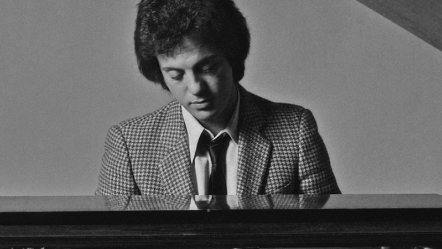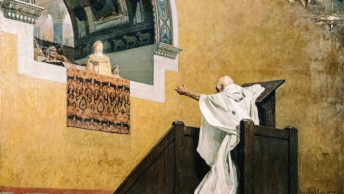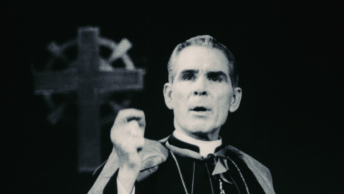If this old adage is valid, then people my age will have some serious answering to do. The origins of this phrase date back to the statement that Whom the gods love; Best go first. Its history looks to the Greek historian Herodotus, who recounted the story in his History, circa 445 BC, of two young brothers who took the place of missing oxen, hitching themselves to their mother’s wagon so that they could transport her to a festival, honoring Hera, the pagan goddess of marriage, women and family.
Their mother was so happy about what her sons had done that she prayed to Hera to reward them with the greatest gift that anyone might receive, whereupon her sons lay down to sleep and never woke again. There are so many other versions, including a Hollywood film of this phrase that is has risked becoming a cliché, devoid of any essential meaning.
During my research, I stumbled on a song, Only the Good Die Young, written and performed by Billy Joel. Its lyrics captured the salient meaning of what it holds for us today, especially the lustful flavor of its first verse:
Come on Virginia, don’t let me wait
You Catholic girls start much too late
Aw, but sooner or later, it comes down to fate
I might as well be the one;
Pre-Chorus
They say there’s a heaven for those who will wait
Some say its better, but I say it ain’t
I’d rather laugh with the sinners than cry with the saints
The sinners are much more fun;
Chorus
Darling, only the good die young
Woah, woah…………………….
I doubt if I have ever encountered, especially from a popular singer, such as Joel, a more direct assault on the Catholic teachings on chastity and sexual abstinence. More than likely the lascivious suitor is just looking for another notch in his belt. It makes one wonder how many Virginias have forgotten what they learned from their Catholic schools and sacrificed their virginity to his seductive charms. On its surface, it seems that Joel had become a soldier in Gramsci’s Long March through the Culture that urged using Catholic women to bring down the West. It is thoughts such as this that makes me think that it isn’t the good that die so young but more the sense of morality and virtue that perishes early. Perhaps we should update the adage to read: Only Innocence Dies Young. During my reading, I have found many articles on child trafficking, sexual attacks on children and even infants and perverse assaults of all kinds on our kids. It is a derivative to the ideas I developed on this website in a previous essay, Birthmark Catholics. Pederasts and other homosexuals have figuratively put bulls eyes on the backs of our young. They proudly boast that we are coming for your children.
These ideas have been brewing for centuries. In reading Paul Krause’s essay in a 2021 edition of the Imaginative Conservative, I found an early appearance of the nation’s belief in the American Adam…and American liberalism. In his Innocence Loss: Reading Nineteenth Century American Literature, Krause focuses on R.W.B. Lewis’s American Adam as one who if were freed from the bondage of the past, human nature and sin…would be boundless in his aspiration and opportunities as Adam was in the Garden before the Fall.
While these seeds of a toxin for innocence on a grand scale were planted, they did not bear fruit until the rise of the Progressives in the early 20th century. World War I and its aftermath set the movement back a generation as an aimless Lost Generation’s idealism had turned into nihilism.
According to Berniece McKee’s piece, the Deconstruction of Innocence in the Twentieth Century, published in Medium in 2021, used fictional characters to demonstrate how the coming of age and the loss of innocence is a natural phenomenon. To see this, one need only read many of the classics in the Western Canon. From Shakespeare’s Hamlet to Homer’s The Odyssey, coming of age is a recurring theme in literature all over the world. Due to mishaps or family loss, early in their lives, many people are being deprived of their childhoods and lose their innocence in the process. In a word, they have to grow up too fast.
Most of these characters eventually learn to navigate through the tragedies that have robbed them of their innocence. When writing about loss of innocence in literature, I would even include the film and stage media, the author usually means that the childhood of a particular character has come crashing down due to a multitude of reasons and circumstances, which have prematurely forced them into adulthood.
I think this happens way before their readiness for such adult activities, problems and challenges. Many young people’s lives have been destroyed by this. I believe that cultural forces have been conspiring against the innocent, undermining family, religious and national unity. McKee’s choice of Holden Caufield, the protagonist of the classic, Catcher in the Rye, written by J. D. Salinger in 1951, vividly underscores this. Caufield is a skeptic, who has just been expelled from school after the loss of his brother. He is having a hard time coming to grips with his life. He wants to protect the innocence of children, which McKee says is symbolic of his trying to protect what is left of his own innocence, which he comes to terms with at the end of the book.
More relevant to her theme is Harper Lee’s 1960 novel To Kill a Mockingbird. Scout is a six-year-old girl, whose widowed father, Atticus Finch, takes on the unpopular case of a black man, accused of raping a white woman in Alabama in the thirties. Passions run deeply as he proves his innocence. From the shadows, Scout’s little ears are absorbing all the sordid details of a vicious, prejudiced world, filled with angry and hostile people.
Innocence, according to McKee is usually related to a lack of knowledge and when the character becomes aware of the world around him, he loses that innocence. This idea immediately conjures up images of Eve and the serpent in the Garden of Eden. It was the tree of the knowledge of good and evil whose fruit our first parents were forbidden to eat. When they did, they forfeited their innocence and sin entered the world and became part of humans DNA.
Growing up in the fifties, we did not know a lot about sexuality. Most of the girls dressed modestly and the few who flaunted their sexuality soon had a reputation. In my 7th Grade, there was one girl, a year ahead of us, who had to sing a song entitled Beauty for a school play. I remember her performance and the tight-fitting costume that emphasized her physical maturity. Her voice was weak, and it only added to her more visual traits.
By graduation, we all knew sexuality existed, because in many ways it was all around us. While Netflix did not exist yet, R-rated movies abounded, and one just had to make peace with its allurements. But most of us I trust, realized that getting sexually involved while still in high school or even in college was harmful to our future lives and just plain wrong.
There were many social supports, especially our parents. Most adults knew that early pregnancy, promiscuity, and lust could ruin our lives, so they protected us the best way they could, given the changes in social mores, especially our movies and music. This was the last great cry for parents, the Church and other adults to save impressionable girls and boys from the snares of the world, the flesh, and the devil. Playboy debuted in 1953 in Chicago. Parents and drug stores tried to keep it from us but the very curious procured copies and hid them under their beds. I had a friend who read Grace Metalious’s salacious novel, Peyton Place, written in 1956.
The sixties changed everything. Vietnam and the assassinations of the Kennedys and Martin Luther King signaled the death of, not only innocence, but also idealism as well. We began to be exposed to marijuana, harder drugs, sex education, and the Darwinian reduction of humanity to the status of educated apes.
At the heart of all these nefarious evils that have permeated American culture were companies, such as Nike, Inc. They tuned into the cultural transfiguration with their long-time slogan, Just Do It. I am fully aware that the just do it slogan has had serious cultural ramifications. Nike is telling the American people, especially its kids, that we are all hedonists at heart. So, if it feels good, just do it! When Nike says just do it, we all knew what it was. I remember reading about silent film actress, the sexy Clara Bow, who was the It Girl.
To the contrary, before Nike’s slogan, we all realize the it of the fifties was something that had little to do with pleasure or personal gratification. It was usually something that was good for us but we did not particularly want to do because it was inconvenient or hurt a lot.
What strikes me about this is that it is such a cultural inversion. Virtually all our nuns in grade school in the fifties, just said do it or its twin, don’t do it through my first eight years of education. The do’s and don’ts depended on whether the behavior was good or bad. At home our parents would do the same thing. It is apparent to me that what Nike was pushing was the Freudian-based idea of ridding oneself of all repressed feelings about sexual and immoral activities.
My four years at Xavier H. S. in Manhattan, a Jesuit military school, just reinforced the good do’s and the bad don’ts. I was told to just do it so many times my head could do a quick 180 degree turn at the blinking of an eye. If I did not do it quickly enough, I got a JUG. JUG was that form of Jesuit recreation that usually included marching around our quadrangle, lugging a 9.1-pound M-1 rifle for two hours after school. I got very good at just doing it.
Fortunately, those were the days when adults with traditional values were running the show. And they really cared, not just about our temporal but also our eternal well-being. Now the shoe is on the other foot, and we have a society whose adults have literally stood the parental imperative on its head. Instead of well-being, pleasure for us is the cardinal rule for them.
How many of us remember the vulgar Secretary of Education under Bill Clinton? Joycelyn Elders boldly told us that masturbation should be taught in the first grade. This is comical on the surface but Satanic at its core. Sex education eventually led to the gradual decline of moral barriers, the break-down of the family structure, the acceptance of homosexual behavior and even marriage. Now we can add the increase in gender identity and barbaric surgeries and drugs used on confused children that will invariably mutilate their bodies and ruin their lives.
This is a tragic addition to the hordes of pederastic coaches, scout leaders, priests, and ministers of other faiths who have preyed on thousands of trusting children over the years. There are just not enough millstones to accommodate all of them.
It has now become a truism that if so many people, especially the young, had not gladly taken up the Nike challenge and were not just doing it without benefit of clergy or a justice of the peace, our culture would not be in such great peril. But the sad fact is millions of people have been just doing it to the tune of near a million abortions a year, incalculable incidence of sexually transmitted diseases, broken marriages, and other social ills. To date over 64,000,000 unborn babies have been cheated out of their natural right to life.
This is a sobering thought to know that we have a multi-billion-dollar business community that flies in the face of the nation’s traditional Judeo-Christian morality, such as Planned Parenthood. More mainstream companies, such as Target and Anheuser-Busch, have embarrassed themselves and angered their consumers with their ill-fated campaigns to promote homosexual and transgendered acceptance.
Fortunately, there are still millions of old-fashion people out there, who realize that someone must pick up the moral baton of the Christian challenge to Love thy neighbor! Innocence begins in the womb. Groups exist to fight all these attacks on the young, especially abortion. What better way to help than to make out a check to your parish prolife committee, the Vitae Foundation, Life Teens, and other groups. You might also consider joining such a group. As Sister Mary Ellen used to say to me in the third grade, William, just do it!








